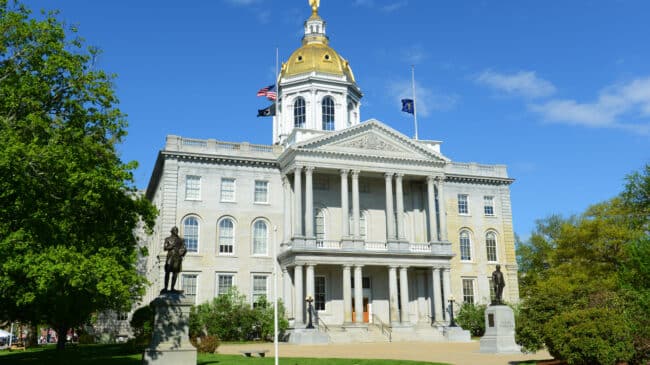New Hampshire Rep. Kevin Verville (R-Rockingham County) has pre-filed a bill for the 2024 legislative session that would legally allow for the purchase and use of certain psychedelics. New Hampshire House Bill 1693 would allow qualified individuals to purchase and consume LSD, mescaline, and psilocybin. The bill contains several novel provisions that could influence future proposals for psychedelic legalization in New Hampshire and elsewhere.
If passed, New Hampshire’s approach would be similar to the structure of a medical cannabis program. House Bill 1693 would allow qualified patients to obtain a license to purchase and possess up to two ounces of usable psychedelics from a state-licensed facility. To become a qualified patient, a person must be diagnosed with one of a variety of mental health conditions and receive a recommendation from a licensed doctor, nurse practitioner, or mental health provider.
Similar to the state’s existing medical cannabis law, the bill proposes that all commercial manufacture and distribution of psychedelic products must be done by licensed alternative treatment centers (ATCs). At ATCs, qualifying patients would be required to present a state-issued ID card before a purchase. The state already regulates alternative treatment centers extensively, and Verville’s proposal would build on that extant regulation.
While there are similarities to New Hampshire’s medical cannabis law, HB 1693 contains unique provisions that will help build a solid framework that is specific to regulating psychedelics:
At-home use
In-person psychedelic therapy tends to be more costly than alternatives like remote therapy or at-home use because medical professionals must guide and supervise these in-person treatments. Meeting legal and regulatory standards to license a physical location, train staff, and offer supplementary services, such as pre- and post-session consultations, all contribute to the cost.
Creating a comfortable environment, implementing risk management strategies, and securing insurance coverage further add to this overhead. The limited availability of professionals and treatment centers, coupled with high demand for services, can result in a cost of care that renders psychedelic therapy inaccessible for many households. In Oregon, for instance, a single in-person session can cost more than $3,000.
Additionally, in-person psychedelic therapy might not be the best means of treating some conditions, such as migraines, which require opportunistic self-administration. It would be impractical to require someone to drive to a healing center at the onset of every headache.
The bill would allow the health department to modify the maximum dispensation of psychedelics to an amount “reasonably necessary for a 10-day supply.”
Inclusion of a synthetic
House Bill 1693 is one of the only legislative proposals nationwide to propose legalizing a synthetic psychedelic substance. LSD is a classic psychedelic, widely popular, and has a history of therapeutic use.
California State Sen. Scott Wiener (D-San Francisco) had been the only other lawmaker to propose decriminalizing personal possession of LSD, although that provision was amended out of his bill before passage. California lawmakers passed a version of Wiener’s legislation but the bill was subsequently vetoed by Gov. Gavin Newsom.
Flexible qualifying conditions
House Bill 1693 proposes a flexible approach to identifying qualifying conditions. The bill would allow any mental health condition to be a qualifying use case if there is published evidence in any medical or scientific journal indicating the efficacy of psychedelic substances as a treatment. It would grant the New Hampshire Department of Health and Human Services the authority to adjust the two-ounce possession limit it proposes to an amount that is reasonably necessary for a 10-day supply. Additionally, it would also allow providers to recommend psychedelics for “any novel or emergent illness which is not categorized in the Diagnostic and Statistical Manual of Mental Disorders but is diagnosed by a state licensed mental health professional.”
While federally approved clinical trials with psychedelics are limited to a few conditions, such as depression or trauma, there are now regular peer-review studies looking at how psychedelics treat a wide array of mental health conditions. In just the last few months, for instance, researchers have published evidence on the use of psilocybin for bipolar disorder and ibogaine, another botanical psychedelic, to treat brain injury.
Legal protections for license holders
New Hampshire HB 1693 would introduce legal protections for individuals involved in the manufacture or distribution of psychedelic substances. License holders, including those operating alternative treatment centers, are granted specific protections in the bill, such as considerations for parental custody and occupational licensing.
Despite some safety concerns associated with personal possession of psychedelics, a Reason Foundation preliminary investigation into the public health impacts of psychedelic legalization in Colorado revealed there have been few recorded incidents of violence or abuse related to psychedelics. Colorado’s model demonstrates that, with responsible regulations and guidelines, the personal use of psychedelics need not endanger public safety.
Law enforcement agencies in Denver and other well-populated counties have not reported psychedelics as a significant public safety issue. While there are anecdotal reports of harms related to psychedelics, such incidents are difficult to quantify. Negative public health impacts, particularly safety concerns related to legal psychedelic possession in Colorado, appear to be negligible. This suggests that permitting self-administration of psychedelics would not threaten public health in New Hampshire.
Conclusion
New Hampshire HB 1693 aims to responsibly legalize personal possession of psychedelics. It offers the legalization of both synthetic and botanical psychedelics, flexible qualifying conditions, and legal protections for license holders, providing a unique framework for psychedelic therapy that is cost-effective and accessible.
